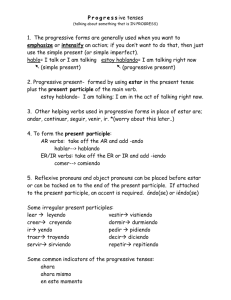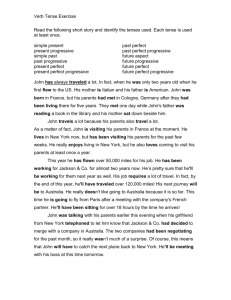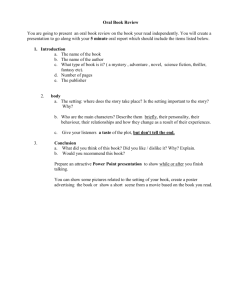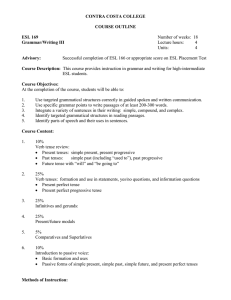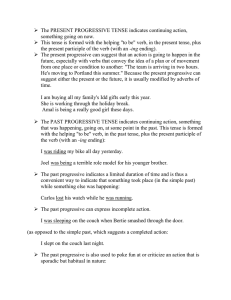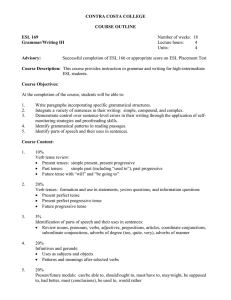Ch 1 to 3 review.doc
advertisement
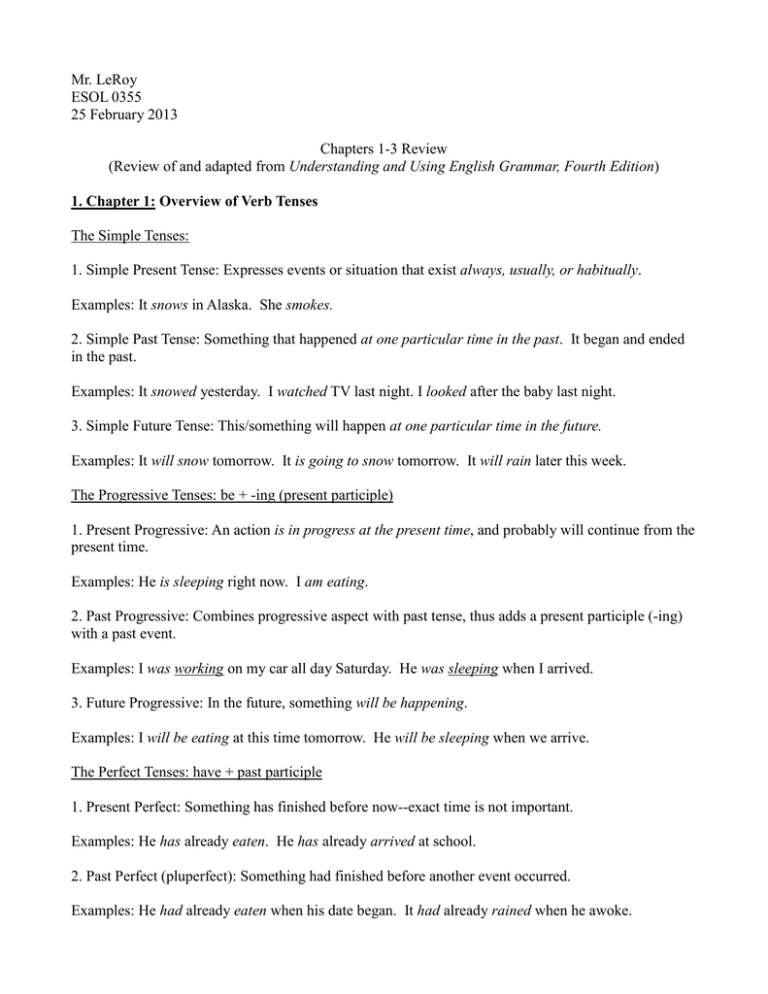
Mr. LeRoy ESOL 0355 25 February 2013 Chapters 1-3 Review (Review of and adapted from Understanding and Using English Grammar, Fourth Edition) 1. Chapter 1: Overview of Verb Tenses The Simple Tenses: 1. Simple Present Tense: Expresses events or situation that exist always, usually, or habitually. Examples: It snows in Alaska. She smokes. 2. Simple Past Tense: Something that happened at one particular time in the past. It began and ended in the past. Examples: It snowed yesterday. I watched TV last night. I looked after the baby last night. 3. Simple Future Tense: This/something will happen at one particular time in the future. Examples: It will snow tomorrow. It is going to snow tomorrow. It will rain later this week. The Progressive Tenses: be + -ing (present participle) 1. Present Progressive: An action is in progress at the present time, and probably will continue from the present time. Examples: He is sleeping right now. I am eating. 2. Past Progressive: Combines progressive aspect with past tense, thus adds a present participle (-ing) with a past event. Examples: I was working on my car all day Saturday. He was sleeping when I arrived. 3. Future Progressive: In the future, something will be happening. Examples: I will be eating at this time tomorrow. He will be sleeping when we arrive. The Perfect Tenses: have + past participle 1. Present Perfect: Something has finished before now--exact time is not important. Examples: He has already eaten. He has already arrived at school. 2. Past Perfect (pluperfect): Something had finished before another event occurred. Examples: He had already eaten when his date began. It had already rained when he awoke. 3. Future Perfect: describes an event that is expected or planned to happen before a time of reference in the future. Examples: He will have already eaten when his wife arrives. I will have arrived at the dinner by 7 tonight. The Perfect Progressive Tenses: have + been + -ing 1. Present Perfect Progressive: Tells that something was happening before now and up until now, and for how long. Examples: John has been studying for two hours. I have been eating for about 5 minutes. 2. Past Perfect Progressive: Something was in progress for a specified amount of time until another even occurred. Examples: I had been eating for 5 minutes before work called me. John had been studying for two hours before his mom called. 3. Future Perfect Progressive: Something will be in progress for a specified amount of time before another event in the future. Examples: John will have been studying for two hours by the time his mom calls him tonight. By three this afternoon we will have been drinking for 4 hours. Note: The charts on pgs. 6-7 will help you study these tenses for the test. Note: Study the -ing and -ed chart on pg. 10. 2. Chapter 2: Present and Past; Simple and Progressive Pg. 16, Non-Progressive Verbs: Some words are non-progressive and will not have the -ing present participle added to them. Examples: I know your cousin. (Not: I am knowing your cousin.) Review all the words in chart 2-3 (pg. 16). Review the charts on pgs. 20-21. Review the pronunciation chart on pg. 27. Review the chart on pg. 33 on always, forever, and constantly. Example: My grammar teacher is always/constantly giving us long chapter reviews. Review the chart on pg. 34. 3. Chapter 3: Perfect and Perfect Progressive Tenses Review the chart on p. 38--it is very similar to the chart on pg.4. Pay special attention to the question and time terms. Review the chart on pg. 42 on pronunciation in spoken English. Review the chart on pg. 43. Review the chart on pg. 46. Review the chart on pg. 50. Review the pronunciation chart on pg. 53. Review the chart on pg. 55. Note: We will do some of the exercises from chapters 2 and 3 at the beginning of class tomorrow.

